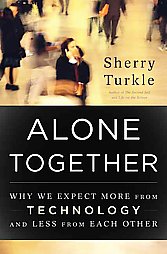book review | Alone Together: Why We Expect More from Technology and Less from Each Other
January 24, 2011 by R.U. Sirius
 In 1938, existentialist philosopher Jean Paul Sartre wrote “Hell is other people.” Sartre may never have cobbled together his existential philosophy that viewed human individuals as utterly alone — alienated, atomized beings in a vast meaningless universe — if he had grown up playing with social robots and holding others at a discreet psychological distance by communicating with them nearly exclusively via instant messaging.
In 1938, existentialist philosopher Jean Paul Sartre wrote “Hell is other people.” Sartre may never have cobbled together his existential philosophy that viewed human individuals as utterly alone — alienated, atomized beings in a vast meaningless universe — if he had grown up playing with social robots and holding others at a discreet psychological distance by communicating with them nearly exclusively via instant messaging.
According to Wikipedia, one of the first mentions of loneliness came from Shakespeare’s Coriolanus, but I’d bet I could find passages that fairly reek of loneliness and alienation sprinkled throughout most of written history… if only I had an intelligent search program that could comb through the classics and correlate for themes using archaic synonyms.
With Alone Together: Why We Expect More from Technology and Less From Each Other (Basic Books, 2011), Dr. Sherry Turkle, the widely noted MIT professor and explorer of communications technology, human psychology and relationships, tries to convince us that today’s technologically enhanced loneliness and alienation has particularly dangerous characteristics. I’m not convinced, but I’m listening.
Let me put this into context. Alone Together is not a polemic. While Turkle is certainly out to make a point about (among other things) the possibility that the human-bot connection may satiate our need for human-to-human connection — ultimately leaving us poorer for it — the book is an enjoyable read. Turkle shares poignant and sometimes funny stories about children, seniors, and many folks in between interacting with today’s social robots. And she brings us the inner thoughts of teenagers and young adults as they explore their emotions, identities, and relationships in an entirely novel social milieu mediated by relatively new communications technologies
In one example, a 14 year old girl named Mona gets on Facebook believing it will be an opportunity to “broadcast the real me.” However, she immediately finds herself even more self-conscious. Turkle writes, “Mona worries that she does not have enough social life to make herself interesting. ‘What kind of a personal life should I say I have?’” This may seem like a small point, but it’s telling. Turkle talks to a number of teens and young adults who feel that their ability to communicate and relate to people spontaneously “in real life” has atrophied as the result of both the desire and the opportunity to present themselves instead in a considered manner (however brief such reflection may be) on Facebook. Issues of social status and approval and the potential permanence of Facebook posts subvert all tendencies toward the types of authentic, risky communications that might lead to healthy and interesting relationships.
Young people also talk to Ms. Turkle about navigating the emotional complexities of being always accessible via cell phone. And as instant messaging largely replaces phone calls as the major mode of at-a-distance communication, young people are afforded another opportunity to exchange the authenticity of real-time conversation for a calculated presentation.
But calculation, in Turkle’s exploration, is not the same thing as contemplation or deep thinking. Ms. Turkle worries that by being always tethered to one another via cellular communications — and by being continually distracted by 24/7 connectedness to information, entertainment and shallow interpersonal distraction, we are losing our ability to contemplate — to think…. deeply, privately, and at length.
“In democracy, perhaps we all need to begin with the assumption that everyone has something to hide, a zone of private action and reflection, one that must be protected no matter what our techno-enthusiasms. I am haunted by the sixteen-year-old boy who told me that when he needs to make a private call, he uses a pay phone that takes coins and complains how hard it is to find one in Boston. And I am haunted by the girl who summed up her reaction to losing online privacy by asking, ‘Who would care about me and my little life?'” — Sherry Turkle, Alone Together
Most human cultures have evolved over centuries. Their customs and taboos — in other words, their ways of presenting themselves and interacting with each other — have been deeply rooted and have changed slowly over long generations. Today — and into the foreseeable future — people are living in a new and constantly changing terrain for presentation and communication. We are making up the rules (if any), and finding out who we are in this context, as we go, and without an instruction manual. However optimistic and enthusiastic some of us may be about accelerating change, it behooves us to pay attention to the works of explorers of the deeply personal like Sherry Turkle, to insure that we expand — and not contract — the best aspects of our humanity.
Perhaps with social robots coming online and becoming ever better companions, human beings will simply rise to the competitive challenge to be better company than the bots — to be more empathetic, more thrilling, funnier, more creative, more helpful. Perhaps we will end up not alone together, but deeply connected… bots included.